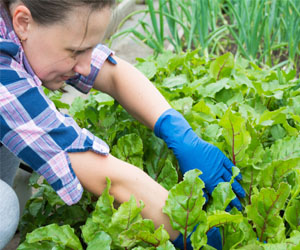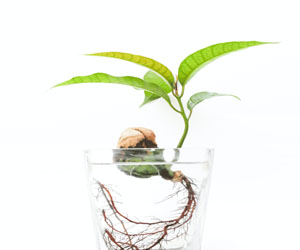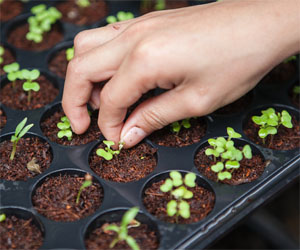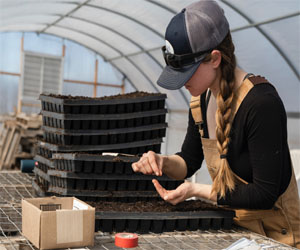


The Fruits Of Gardener's Labor

As the warm sun bathes the fields and gardens in golden light, it's the time of year gardeners eagerly anticipate. The culmination of months of hard work, care, and nurturing is a bountiful yield of fresh, homegrown produce. Abundant harvests are not just a reward for the green-thumbed; they signify a deep connection with nature, self-sufficiency, and the joy of reaping what you sow.
The Joy Of Abundant Harvests
Abundant harvests evoke a sense of joy that only a gardener can truly understand. Whether you have a small backyard plot, a balcony garden, or a sprawling farm, the sight of your plants heavy with fruits and vegetables is a sight to behold. It's a testament to your dedication and patience. This joy is often accompanied by the satisfaction of knowing that you played a significant role in the growth of these vibrant edibles.
Connection To Nature
Gardening is a harmonious dance with nature. Abundant harvests illustrate the beautiful partnership between the gardener and the Earth. Tending to the soil, choosing the right seeds or saplings, watering, and protecting your plants from pests and disease — all these efforts are rewarded by the Earth's generous bounty. The cycles of life in your garden, from planting to harvesting, mirror the larger cycles of nature, and they remind us of our place in the natural world.
Self-Sufficiency And Sustainability
Abundant harvests also represent a move toward self-sufficiency and sustainability. Growing your own food not only reduces your reliance on commercial agriculture but also ensures that you have a fresh and healthy food source right at your doorstep. It empowers individuals and families to take control of their food supply and make environmentally conscious choices. When you produce your food, you reduce the carbon footprint associated with transportation and packaging.
Health And Nutrition
The fruits of abundant harvests are some of the healthiest foods you can consume. Homegrown produce is free from harmful chemicals and pesticides, offering unparalleled freshness and nutrition. These vegetables and fruits are picked at their peak ripeness, preserving their vitamins, minerals, and flavors. When you have an abundant harvest, you have an abundance of wholesome, nutrient-rich foods at your disposal.
Sharing The Bounty
Abundant harvests often lead to an abundance that extends beyond your own household. Gardeners frequently find themselves with more produce than they can personally consume. This surplus can be shared with friends, family, and the community. Sharing the fruits of your labor is a deeply satisfying experience that strengthens bonds and fosters a sense of community.
Abundant harvests are the culmination of hard work, a connection with nature, and a commitment to self-sufficiency and sustainability. Gardening, in all its forms, offers a multitude of benefits, both tangible and intangible. As you stand in your garden, surrounded by a sea of ripe vegetables and fruits, take a moment to savor the joy, pride, and sense of accomplishment that abundant harvests bring. Embrace the opportunity to live in harmony with nature, nurture your health, and share the bounty with others, for the rewards of abundant harvests go far beyond the dinner table.
A Clean Home And A Clean Conscience
 Environmental Impact: Traditional cleaning products can contain hazardous chemicals that, when washed down the drain, enter water systems and harm aquatic life. Green cleaning helps reduce water pollution and the environmental impact of your cleaning routine.
Environmental Impact: Traditional cleaning products can contain hazardous chemicals that, when washed down the drain, enter water systems and harm aquatic life. Green cleaning helps reduce water pollution and the environmental impact of your cleaning routine.
Reducing Plastic Waste: Many green cleaning products come in recyclable or refillable containers, reducing plastic waste and contributing to a healthier planet.
Sustainability: By opting for sustainable cleaning practices, you contribute to a more eco-friendly world and encourage the development of environmentally responsible products.
How To Get Started With Green Cleaning
Assess Your Current Cleaning Products: Start by taking a look at the cleaning products you use. Identify which ones contain harsh chemicals and consider replacing them with greener alternatives.
Make Your Own Cleaning Solutions: Many effective cleaning solutions can be made using simple ingredients found in your pantry. For example, a mixture of vinegar and water can be a powerful all-purpose cleaner.
Read Labels: When purchasing cleaning products, read labels carefully. Look for certifications like "EcoLogo" or "Green Seal" to ensure that the product meets environmental and health standards.
Choose Reusable Cleaning Tools: Opt for reusable cleaning tools like microfiber cloths and mop heads to reduce waste.
Reduce, Reuse, Recycle: Use cleaning products and containers that are recyclable or refillable. This minimizes your environmental footprint.
The Green Cleaning Revolution
Green cleaning is not just a trend; it's a fundamental shift towards responsible and sustainable cleaning practices.
The Pursuit Of Water Efficiency
 Sustainability: As populations grow and climate change exacerbates water scarcity, efficient water use is necessary to meet the needs of current and future generations.
Sustainability: As populations grow and climate change exacerbates water scarcity, efficient water use is necessary to meet the needs of current and future generations.
Environmental Preservation: Efficient water use helps protect aquatic ecosystems, conserves habitats, and reduces the negative impacts of water extraction on nature.
Economic Benefits: By reducing water waste, businesses and industries can cut costs, enhance their resilience to water scarcity, and maintain profitability.
Strategies For Achieving Water Efficiency
Numerous strategies and technologies promote water efficiency:
Water-Saving Appliances: Low-flow toilets, high-efficiency washing machines, and water-efficient faucets help reduce domestic water use.
Smart Irrigation: Advanced irrigation systems equipped with sensors and weather data can optimize watering schedules, reducing water waste in agriculture and landscaping.
Leak Detection: Identifying and repairing leaks in water supply systems is a crucial step in preventing water loss.
Wastewater Treatment And Reuse: Treating and reusing wastewater for non-potable purposes like irrigation or industrial processes conserves freshwater resources.
Public Awareness: Educational campaigns and policies can encourage responsible water use among individuals and communities.
Positive Impacts Of Water Efficiency
Efficient water use offers a range of positive impacts:
Conserving Water Resources: By minimizing water waste, we ensure that enough freshwater is available for essential needs, even during periods of scarcity.
Balancing Prosperity And The Planet
 One of the key principles of sustainable development is the recognition that our planet's resources are finite. As we continue to grow in population and economic activity, it becomes imperative to manage our resources more responsibly. This involves reducing resource consumption, minimizing waste, and promoting energy efficiency. Sustainable development encourages innovation and the adoption of cleaner, greener technologies to mitigate our impact on the environment.
One of the key principles of sustainable development is the recognition that our planet's resources are finite. As we continue to grow in population and economic activity, it becomes imperative to manage our resources more responsibly. This involves reducing resource consumption, minimizing waste, and promoting energy efficiency. Sustainable development encourages innovation and the adoption of cleaner, greener technologies to mitigate our impact on the environment.
Environmental sustainability is a central pillar of sustainable development. It advocates for the conservation of ecosystems, the protection of biodiversity, and the reduction of pollution and emissions. It promotes responsible land and resource management, focusing on sustainable agriculture, forestry, and fisheries. Additionally, it calls for the reduction of greenhouse gas emissions to combat climate change, a global challenge that threatens the well-being of people and ecosystems alike.
However, sustainable development is not only about the environment. It also prioritizes social equity and inclusivity. This means ensuring that all members of society have access to basic services like healthcare, education, and clean water. It aims to reduce poverty and inequality, empowering communities and individuals to improve their own quality of life. A key component of this social dimension is the active participation of all stakeholders in decision-making processes, ensuring that no one is left behind.
Economic growth is the third critical aspect of sustainable development. While it seeks to balance prosperity with environmental and social goals, it does not advocate for the halt of economic progress. Instead, it calls for a transition to a more circular and sustainable economy. This involves adopting green business practices, investing in clean technologies, and promoting sustainable consumption and production patterns.






Nurturing A Sustainable Tomorrow
 Reduce, Reuse, Recycle: The famous "Three R's" serve as the foundation of eco-conscious living. Reducing waste through mindful consumption, reusing items when possible, and recycling materials are essential practices that help divert waste from landfills and conserve valuable resources.
Reduce, Reuse, Recycle: The famous "Three R's" serve as the foundation of eco-conscious living. Reducing waste through mindful consumption, reusing items when possible, and recycling materials are essential practices that help divert waste from landfills and conserve valuable resources.
Energy Efficiency: Reducing energy consumption not only saves money but also reduces greenhouse gas emissions. Simple steps like using energy-efficient appliances, sealing drafts in homes, and turning off lights and electronics when not in use can make a significant difference.
Sustainable Transportation: Opting for eco-friendly modes of transportation, such as biking, carpooling, or using public transit, can help reduce air pollution and the carbon footprint associated with personal travel.
Mindful Consumption: Eco-conscious individuals make deliberate choices when it comes to the products they buy. They prioritize environmentally friendly and sustainably sourced goods, supporting companies that adhere to eco-conscious principles.
Conservation Of Water: Water is a finite resource, and eco-conscious living encourages water conservation through efficient fixtures, rainwater harvesting, and responsible water use practices.
Local And Organic Foods: Supporting local and organic food production not only reduces the carbon footprint associated with food transportation but also promotes healthier eating and sustainable agriculture.
A Crucial Step Towards A Sustainable Future
 The Global Water Challenge
The Global Water Challenge
Water scarcity is a pressing concern that affects both developed and developing nations. Climate change, population growth, urbanization, and inefficient water management practices all contribute to this crisis. According to the United Nations, by 2030, nearly half of the global population will be living in areas with high water stress, underscoring the urgency of effective water conservation.
The Significance Of Water Conservation
Water conservation is the practice of using water more efficiently and minimizing waste. It is a fundamental approach to address the water crisis for several reasons:
Preserving Natural Ecosystems: Adequate water conservation ensures that freshwater ecosystems, such as rivers, lakes, and wetlands, maintain their vitality, safeguarding biodiversity and ecological balance.
Reducing Energy Consumption: Treating, transporting, and heating water demands substantial energy. Water conservation lowers energy use and carbon emissions, contributing to a greener environment.
Mitigating Water Pollution: By reducing water usage, less polluted water enters wastewater treatment plants, making the treatment process more effective and minimizing the release of contaminants into natural water bodies.
Safeguarding Future Generations: Water is a finite resource. Conserving water today ensures that future generations will have access to clean, safe water.